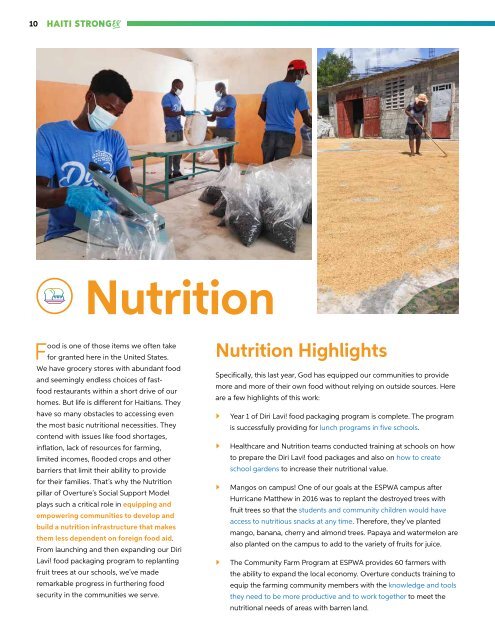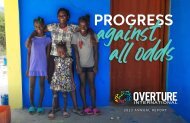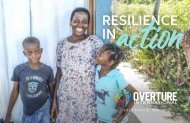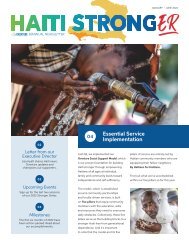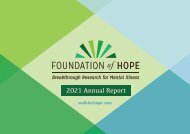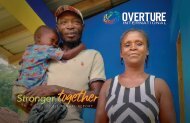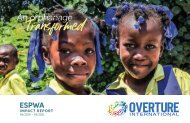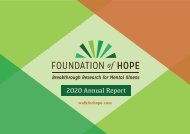Overture 2023 Summer Newsletter
Create successful ePaper yourself
Turn your PDF publications into a flip-book with our unique Google optimized e-Paper software.
10<br />
Nutrition<br />
Food is one of those items we often take<br />
for granted here in the United States.<br />
We have grocery stores with abundant food<br />
and seemingly endless choices of fastfood<br />
restaurants within a short drive of our<br />
homes. But life is different for Haitians. They<br />
have so many obstacles to accessing even<br />
the most basic nutritional necessities. They<br />
contend with issues like food shortages,<br />
inflation, lack of resources for farming,<br />
limited incomes, flooded crops and other<br />
barriers that limit their ability to provide<br />
for their families. That’s why the Nutrition<br />
pillar of <strong>Overture</strong>’s Social Support Model<br />
plays such a critical role in equipping and<br />
empowering communities to develop and<br />
build a nutrition infrastructure that makes<br />
them less dependent on foreign food aid.<br />
From launching and then expanding our Diri<br />
Lavi! food packaging program to replanting<br />
fruit trees at our schools, we’ve made<br />
remarkable progress in furthering food<br />
security in the communities we serve.<br />
Nutrition Highlights<br />
Specifically, this last year, God has equipped our communities to provide<br />
more and more of their own food without relying on outside sources. Here<br />
are a few highlights of this work:<br />
e Year 1 of Diri Lavi! food packaging program is complete. The program<br />
is successfully providing for lunch programs in five schools.<br />
e Healthcare and Nutrition teams conducted training at schools on how<br />
to prepare the Diri Lavi! food packages and also on how to create<br />
school gardens to increase their nutritional value.<br />
e Mangos on campus! One of our goals at the ESPWA campus after<br />
Hurricane Matthew in 2016 was to replant the destroyed trees with<br />
fruit trees so that the students and community children would have<br />
access to nutritious snacks at any time. Therefore, they've planted<br />
mango, banana, cherry and almond trees. Papaya and watermelon are<br />
also planted on the campus to add to the variety of fruits for juice.<br />
e The Community Farm Program at ESPWA provides 60 farmers with<br />
the ability to expand the local economy. <strong>Overture</strong> conducts training to<br />
equip the farming community members with the knowledge and tools<br />
they need to be more productive and to work together to meet the<br />
nutritional needs of areas with barren land.


